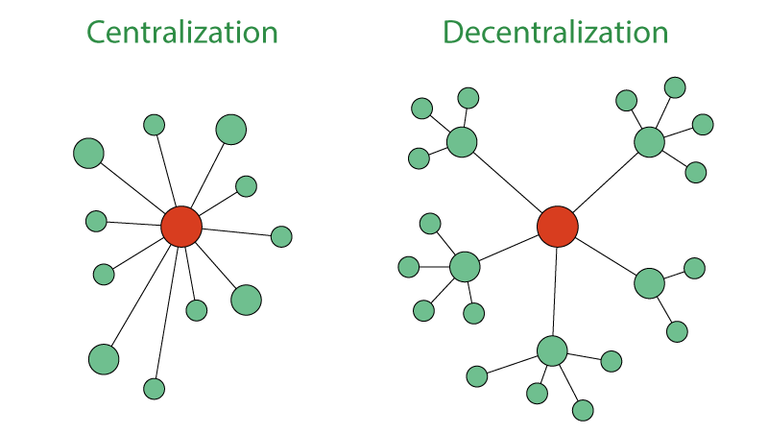Centralized and Decentralized Power
Introduction
In this week’s lecture video Dr. Steve Trost discusses decentralized power and why he believes it can lead our country towards better political, economic, and technological opportunities. After seeing the comparison of centralized freedom and decentralized freedom it appears that with a more decentralized system our government could become more responsive to the people, which could allow for more freedom and representation. In this paper I want to discuss the difference between these two types of powers and where my opinion stands.
The Difference
What is the difference between centralized power and decentralized power?
Well, a centralized system has only one person or one small group of people who get to make the majority of decisions, they hold a higher level of authority. An example of where this kind of power can be seen is in a corporate organization whose CEO is head of the bulk of decisions for the company. Now the upside to this kind of system is that if you can find a trusted and qualified person, or group of people, decisions can be made more efficiently, and communities can see more positive outcomes. The only thing is that you must be sure it’s someone “for the people” though, someone who will take the time to give their full efforts to positively implement the power they hold. The downside to this is that it is subjective to more failure and possible abuse of power. If this power is given to the wrong person, it can be manipulated and executed in all the wrong ways.
Now decentralization power is the opposite of centralization power. A good example of where this can be seen is federal government systems where states get to have their own powers. Decentralization has no single point of control; it allows power to be more spread out among the people. The upside to a system like this is that if one part of it fails another part is still going to be working and there are more local voices being heard. The downside is that it can be difficult to be efficient in making decisions/coordinating. There are also often conflicts with standards and rules.
Leaders and Their Differences
When it comes to a centralized system those that are put in charge are highly qualified with their knowledge and funds for the position they hold. In a decentralized system the more local units involved may not always have the qualified traits to have consistent success. I can think of a solution to both of those issues. A centralized system can often be looked down on because one person is placed in charge and in most cases this person brings corruption into the system. For example, Adolf Hitler, Joseph Stalin, and Kim Jong-un are examples of controlling and villainous leaders in a centralized power position. However, there were men like Franklin D. Roosevelt, Abraham Lincoln, Nelson Mandela, and Mother Teresa who are all famous figures in the world who held centralized power positions and did so with great grace. What I noticed to stand out most about the difference between these two groups of leaders was their Christian values and lack of Christian values. As a follower of Jesus, I found this difference between the two groups very interesting.
Faith
I wanted to share two specific Bible verses that stood out to me and that I believe can really relate to this topic of centralized or decentralized power. "Let everyone be subject to the governing authorities. For there is no authority except from God, and those that exist have been instituted by God. Therefore, whoever resists the authorities resists what God has appointed, and those who resist will incur judgment.” Romans 13:1-2
"When the righteous are in authority, the people rejoice; when the wicked rule, the people mourn.” Proverbs 29:2
Conclusion
In my opinion these ideals promote a more centralized power system in our world but because of mankind’s sinful nature we are all lost when we are apart from God. In 1 Peter 4:10 it says, “Each of you should use whatever gift you have received to serve others, administering it as a good steward of God's varied grace.". I truly believe that some people are created with the purpose to be leaders, whether that be in the church or in the government. So, in conclusion, while I have understanding to both sides of these types of power I ultimately, in an ideal world with ideal leaders, agree more with a centralized system because of its relation to Biblical standards and its organized structure.

Congratulations @aimey.schmidt04! You have completed the following achievement on the Hive blockchain And have been rewarded with New badge(s)
Your next target is to reach 20 posts.
You can view your badges on your board and compare yourself to others in the Ranking
If you no longer want to receive notifications, reply to this comment with the word
STOP